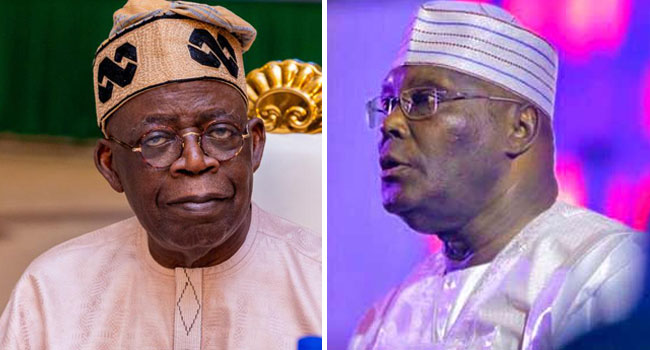Presidential candidate of the Peoples Democratic Party in the February 2023 election, Atiku Abubakar has raised queries on the government of President Bola Ahmed Tinubu’s borrowing $3 billion from African Import Bank.
Atiku, in a statement on his X account on Thursday pointed out that the deal has many suspicious elements which the government must clarify.
He said the deal which grants the federal government $3 billion to stabilise Nigeria’s foreign exchange in exchange for 164.25 million barrels for the repayment of the loan, is at an interest of a little over 12 per cent.
Atiku however pointed out that the crude oil benchmark in Nigeria’s 2024 budget pegs a barrel of crude at $77.96, which means Nigeria will be delivering $12 billion worth of crude oil.
Atiku said more troubling is that the federal government registered a Special Purpose Vehicle at the Bahamas that will borrow the money on behalf of the federal government, raising a red flag that the deal may not be in the interest of Nigeria since Bahamas has history of warehousing illicit money.
See Atiku’s full statement below.
Tinubu’s administration owes Nigerians an explanation for the NNPC $3.3bn emergency loan.
In what appears to be a landmark economic decision of the Bola Tinubu-led administration, the Federal Government last year, precisely on August 16, 2023 through the Nigeria National Petroleum Company (NNPC) secured a $3.3 billion emergency crude repayment loan, which according to the NNPC, was to help give support to the Naira and stabilize the Foreign Exchange market.
The curious thing about this transaction is that up till now, the Federal Government continues to keep mum about it, and the only information available to the public on the mega deal is coming only through unofficial sources from the NNPC.
The deal is supposed to be a crude-for-cash loan arranged by the African Export-Import Bank.
According to information available, a Special Purpose Vehicle called Project Gazelle Funding Limited is driving the deal, and it was incorporated in the Bahamas.
The SPV is the borrower while the NNPC is the sponsor, with an agreement to pay with crude oil to the SPV in order to liquidate the loan at an interest rate that is a little over 12 per cent.
What is even more confounding about this deal is why the Federal Government would register a company in the Bahamas, knowing full well the recent scandal of the Paradise Papers that involved that country.
Curiously also, Nigeria’s current Barrels Produced Daily (BPD) is 1.38 million, and according to the Project Gazelle deal, Nigeria is to supply 90,000 Barrels of its daily production, starting from 2024 till it is up to 164.25 million barrels for the repayment of the loan.
Now, this is where the details get disturbing because Nigeria’s benchmark for the sale of crude per barrel in 2024 is $77.96. A simple multiplication of that figure by 164.25 will give us a whooping $12bn.
It is on this note that we are calling on the Federal Government to speak up on this shady deal.
It is inconceivable that the Federal Government will lead the country to take a loan of $3.3b with an interest rate that is not more than 12 per cent, but with estimated repayment amounting to $12bn.
That is a humongous differential of about $7b between what is in the details of the deal on paper and what indeed is the reality.
There are questions to be answered on the integrity of this deal, and we earnestly request the Federal Government to talk directly on these cloudy details behind the deal.
We therefore demand, on behalf of the ordinary people of Nigeria, that the Federal Government provides answers to the following questions.
- Has the Federal Government accessed the loan?
- Is the loan in the government’s borrowing plan as approved by the National Assembly?
- Who are the parties to the loan, and what specific roles are they expected to play?
- What are the conditions to the loan, including tenor, repayment terms, the collateral, and the interest rate?
- And, lastly, why register an SPV in the Bahamas knowing the recent scandal of the country’s notoriety for warehousing unclean assets?
-AA










More Stories
Trump worries Putin may be playing him, does not want end to Ukraine/Russia war
Pope Francis funeral underway,Trump signals high level meeting with Zelensky at the event
Wike gives condition for peace, scolds Rivers elders